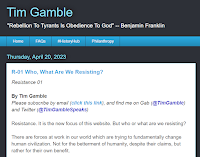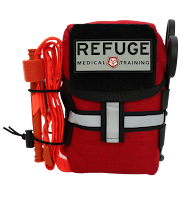By Tim Gamble
The ability to see is something most of us take for granted most of the time. But during an emergency your eyesight is crucial. Even in everyday, normal life you want your eyesight to be as sharp as possible. Start protecting your eyes now. Get an eye exam as soon as possible, and get them regularly. Limit screen time to a reasonable amount. Eat healthy, be active, and control your blood pressure and blood sugar (two things that can badly damage your eyes).
You also want to make sure you can see well during and after a any emergency, as well as in everyday life. If you have prescription glasses or reading glasses, make sure you have backup pairs, just in case. These are as much Survival Gear, as are guns, knives, and multitools. Also, make sure you have, and use, protective eyewear.
- Spare Prescription Glasses - If you have prescription glasses, you may want to go ahead and get a second pair as a back-up. Or even a third pair. Your backup pair doesn't have to have the super expensive designer frames. Just plain black frames for most prescriptions can be found for under $20 if you are willing to look for them.
- Reading Glasses (amazon link) - I use reading glasses, and typically lose or break several pair every year. Right now, they are super cheap and readily available, so it makes sense to stock up many extra. Consider getting a few in higher power, in case your eyesight gets worse later on.
- Sunglasses (amazon link) - Same as with reading glasses, basic sunglasses are are super cheap and readily available at the moment, but may not always be.
- Safety Glasses (Amazon link) and Safety Goggles (Amazon link) - Protecting your eyes from debris and smoke during and after an emergency, as well as in everyday life, is vitally important.
- Flashlights (Amazon link), binoculars (Amazon link), magnifying glasses (Amazon link), and night vision (Amazon link) are all force multipliers. By that, I mean that they extend your vision beyond its normal capabilities.
---------------------------------------------
TimGamble.com is my #Resistance website. I cover politics and current events from a "red-pilled" perspective, as well as providing strategies, information and resources for resisting the forces of tyranny attempting to enslave us all. Much of my attention is given to exposing technocracy, and building alternative systems to those being foisted on us by the technocrats. Please check it out.










